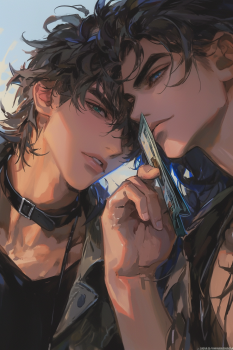Chapter 13
Watching everyone bickering and making a racket, Henry Foster felt a long-lost warmth welling up inside, as if he had returned to the days when he first debuted—everyone striving toward their dreams, working hard to present the best stage, except for a certain someone.
Shifting his gaze, the elevator’s metallic wall reflected the figure of Logan Brooks, his head slightly lowered, seemingly lost in thought.
In Henry Foster’s memory, Logan Brooks had still been a seventeen-year-old kid when he joined. In fact, he didn’t have much of an opinion about someone parachuting in—after all, they were teammates, and he treated him normally.
But back then, Logan Brooks was truly unruly. Just because he had a bad attitude during dance practice once, Henry Foster, who had never lost his temper before, ended up clashing with him. That was the first conflict between them. The two young guys started fighting, and no one could pull them apart.
[You think I came here just to be some idol? Practice for what! I have nothing to say to someone like you who’s scheming so hard to climb up!]
It was only after hearing this that Henry Foster realized why Logan Brooks, who had seemed quite friendly at their first meeting, later changed his attitude.
But at that moment, he wasn’t angry—he was unusually calm.
[I heard you want to be a hip-hop artist.]
As early as the second day after Logan Brooks joined the company, stories about how he’d been sent back to China by his parents after mixing in the underground scene in America as a teenager had spread everywhere. Everyone had heard that his sister had dragged him to a small company like Star Chart, probably to let him get a taste of the entertainment industry.
Whether it was the original intention or the way he got there, it was different from those who had fought their way up through hard work.
[There’s no such thing as a noble or lowly dream—only those that can be realized and those that can’t.]
Henry Foster let go of his grip on his collar.
[I have nothing to say to someone as childish and prejudiced as you.]
A rumor-ridden paranoiac and an arrogant, unruly rebel—their life paths were destined to diverge. Yet, by some twist of fate, they crashed into each other, and a single encounter became an accident scene that couldn’t be repaired even after two years.
Neither cared to understand the other. As long as they could keep a safe distance, they could always maintain a superficial peace.
“By the way, Mr. Samuel,” Logan Brooks said as they exited the elevator, “you guys go ahead and practice, I need to move.”
“Move?!” Caleb Grant’s eyes lit up. “You’re moving back to the dorm? Today?”
Logan Brooks nodded. “Tomorrow. Mr. Carter has been urging me for ages—after all, we have to record the group variety show.”
Henry Foster stared at his profile, and coincidentally, at that moment, he turned back and their eyes met. Everything was so coincidental, just like how their second real intersection was also related to “unspoken rules”—he just happened to find out, and just happened to step in. If it weren’t for these coincidences, they might have gone on never interacting, maybe even until the day the group disbanded.
Logan Brooks smiled, a mischievous glint in his eyes. “Looks like not every brother is happy to have me back home.”
It’s said that many murderers like to revisit the crime scene to seek a certain thrill. Strangely, he had always thought Logan Brooks was that kind of person, but at this very moment, his own ordinary body seemed to secrete some neurotransmitter that induced excitement, as if he were looking forward to something.
Once the safe distance is broken—
This accident will play out tragically all over again.
“Welcome back.” Henry Foster smiled.
Author’s note: This chapter contains some music production terms, so here are some explanations (my knowledge is pretty basic, so feel free to discuss~)
1. trap: A style of electronic music. The earliest “Trap” originated in Atlanta, and in slang, it referred to places where drugs were traded and inescapable living environments. Later, it gradually evolved into a hip-hop electronic music style, usually quite psychedelic, mainly featuring rap or melodic rap. A representative song is The Weeknd’s “The Hills,” which I’ll share on Weibo—it really fits the vibe of this chapter.
2. pluck: A type of timbre in electronic music production. Timbre here basically means the various sounds you hear in a song (especially electronic music). Pluck is a plucked instrument sound (plucking is a way of playing guitar by plucking the strings). This kind of timbre is melodic and fades out gradually—after a note is played, the volume decreases and doesn’t sustain.
3. lead: Like pluck, it’s a type of timbre, but it’s strong and prominent, usually appearing at the beginning of a song. (The song I shared above has a lead right at the start.)
4. drum set: As the name suggests, it’s a set of percussion instruments. Western music places a lot of emphasis on rhythm, so whether the drum set is good or not can largely determine whether a song is a hit. You can try listening to the Western chart-toppers each year—almost every one has an outstanding drum set.
5. demo: A song demo. The songs we hear are all finished products with edited vocals and mixed audio; a demo is basically the prototype.
6. future bass: Also a music genre, a very popular tag right now, but there isn’t a clear definition yet. But you’ve probably heard a lot of it—for example, “Faded” and The Chainsmokers’ “Closer” are both future bass, as well as some “vaporwave” electronic music, so future bass has a broader audience.
